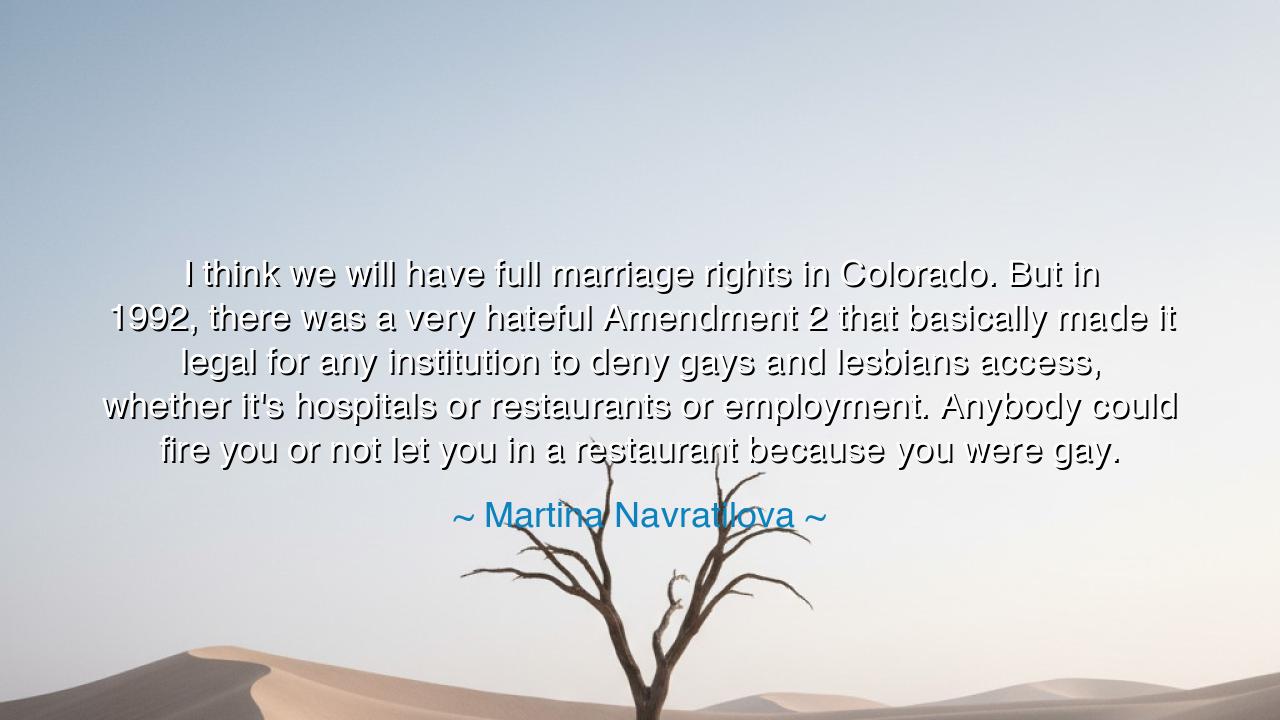
I think we will have full marriage rights in Colorado. But in
I think we will have full marriage rights in Colorado. But in 1992, there was a very hateful Amendment 2 that basically made it legal for any institution to deny gays and lesbians access, whether it's hospitals or restaurants or employment. Anybody could fire you or not let you in a restaurant because you were gay.






In the words of Martina Navratilova: “I think we will have full marriage rights in Colorado. But in 1992, there was a very hateful Amendment 2 that basically made it legal for any institution to deny gays and lesbians access, whether it’s hospitals or restaurants or employment. Anybody could fire you or not let you in a restaurant because you were gay.” These words bear both hope and sorrow. They proclaim faith in the triumph of justice, but they also remember the cruel weight of a past when dignity itself was written out of the law. They remind us that progress is not born in a day, but through struggle, through resistance, and through the courage of those who would not remain silent in the face of oppression.
The ancients often spoke of law as the foundation of the city, the framework upon which all human life depends. Yet they also warned that law without justice is but tyranny cloaked in parchment. Amendment 2, passed in Colorado in 1992, was such a law: it sought not to protect, but to exclude; not to uplift, but to wound. It declared that a people could be stripped of protections simply for who they were. To the gay and lesbian citizens of Colorado, it made clear that their equality was fragile, that their humanity could be denied in the name of majority will.
Consider the pain Navratilova recalls: the thought that one could be turned away from a hospital when sick, or denied entry to a restaurant, or dismissed from one’s employment, not for failing in duty but simply for existing as gay. Such injustices strike at the very heart of civilization, for a society that excludes its own members teaches cruelty instead of compassion. It is like a house that locks some of its children out in the cold, claiming there is not enough warmth to share. Amendment 2 was not simply a political measure; it was a scar upon the soul of a state, and upon the nation that watched.
Yet history teaches us that injustice, though powerful, does not endure forever. The U.S. Supreme Court, in the case of Romer v. Evans (1996), struck down Amendment 2 as unconstitutional, affirming that laws cannot single out groups for disadvantage without violating the promise of equal protection. This victory was not only legal but moral, for it declared that the Constitution’s shield extends to all, including those despised by some. Navratilova’s faith in eventual marriage rights springs from this legacy of resistance: that what was once forbidden can, through courage and persistence, become enshrined as a right.
The deeper meaning of her words is that progress in justice is always contested, always resisted, but always possible. A generation ago, the idea of same-sex marriage rights seemed impossible, yet today it is reality across the United States. And yet, Navratilova warns us not to forget the battles fought, not to erase the memory of cruelty. For if we forget, we risk repeating it. The story of Amendment 2 is not just a relic of the past—it is a reminder that hatred can be clothed in the garments of law, and that vigilance must never rest.
History across the world offers similar tales. In ancient Athens, slaves and women were denied the full rights of citizenship; the law said they were less, but the spirit of humanity knew otherwise. In America, African Americans were once turned away from lunch counters and schools. Each injustice seemed permanent, until it was broken by courage. Navratilova’s testimony belongs in this lineage of struggle: that no matter how deeply exclusion is carved into the laws of men, the higher law of justice calls it forth to be erased.
So let this teaching endure: laws that strip away dignity are not eternal, but fragile; they fall before the steady march of truth. In your own life, stand with those who are denied entry, who are silenced, who are cast out—whether for love, for race, for faith, or for difference. Do not rest content while others bear chains. For as Navratilova’s words remind us, freedom is not the inheritance of a few, but the birthright of all. And every act of courage, every defense of dignity, brings the day of full rights nearer, until none are turned away from the house of humanity.






AAdministratorAdministrator
Welcome, honored guests. Please leave a comment, we will respond soon